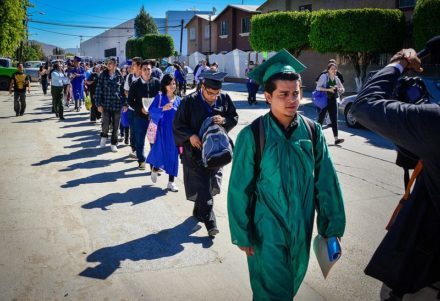Over the weekend, I read dozens of pleas to President Trump and the powers that be across the country to defend DACA, the Deferred Action for Childhood Arrivals program that was initiated by President Obama in 2012 to provide deportation relief for young people who met a set of criteria. Some 800,000 people have obtained work permits with the program and have gone on to be productive young adults.
This morning Attorney General Jeff Sessions announced that the Trump administration will stop considering new applications for DACA dated after Tuesday in an effort to end the program. However, DACA recipients with a permit set to expire before March 5, 2018 can still apply to renew, and those renewals must be filed by October 5, 2017.
The more I thought about the highs and lows of the immigration debate over the past decade, I thought to myself, “we need to demand more.” DACA will not save parents like Rumolo Avelica-Gonzalez, who was taken by ICE when dropping his children off at school. It’s not going to bring back talented, educated young people who were deported to Mexico during the Obama administration like Nancy Landa or “Happy Cosmopolite”. I encourage you to read their blogs for a glimpse of what it’s like to return to a country that you left as a child after having lived for years in the US. DACA is not going to help the undocumented person who hasn’t finished high school or who has not earned a GED. And the DREAM Act, as it has been proposed, isn’t going to advance in helping those who have been left out and left behind because they just missed the age cut-off or they have a minor offense on their record, although it would provide a path to citizenship for that accomplished segment of young people.
We, as a community, need to advocate for a system where the undocumented would have an opportunity to regularize their status periodically. The last mass legalization that was implemented in the US happened during the conservative Reagan administration. There are no ‘once and for all’ solutions with human migration. The reality is that we’re going to see more migration, especially with climate change.
We also need to think about ways that we can reunite families that have already been torn apart by the existing immigration system. Just last month, Maria Mendoza-Sanchez, an oncology nurse, was deported back to Mexico with her husband leaving behind their three daughters, while taking their 12 year old US born son. Removing US born children from school because of parental deportation orders is disruptive to these students’ education. According to estimates from US Census data from 2009-2013, 4.1 million U.S. citizen children under the age of 18 live with at least one undocumented parent. Are we going to continue to let those US citizen children live with the anxiety that their parent might be taken by ICE?
It is my hope as allies and educators that we start demanding more from our officials by looking beyond DACA and looking for solutions that will help the whole family. DACA recipients do not exist by themselves, they belong to families with complex immigration stories and mixed statuses, and we should be looking out for those immigrants whose stories do not fit the most convenient narrative.
Adriana Maestas
She has worked in the non-profit sector, in the K-12 system, and in higher education in various capacities. When she's not writing stories or working on media projects, Adriana trains instructors to teach online at the University of California, Irvine.
She holds a bachelor’s degree in political science from the University of California, Irvine and a master’s degree in public policy from Claremont Graduate University.
Latest posts by Adriana Maestas (see all)
- The Coronavirus Pandemic Poses Unique Problems for Latinx Communities - March 24, 2020
- 25 Chicas de Preparatoria se Graduan Del Instituto de Verano para Negocios y Liderazgo en Los Ángeles - July 24, 2019
- 25 High School Girls Graduate From Summer Institute for Business and Leadership in Los Angeles - July 22, 2019
- Margeaux Randolph Ofrece Educación Técnica a Estudiantes en el Sur de Los Ángeles - April 4, 2019
- Margeaux Randolph Brings Tech Education to Students in South LA - March 29, 2019

